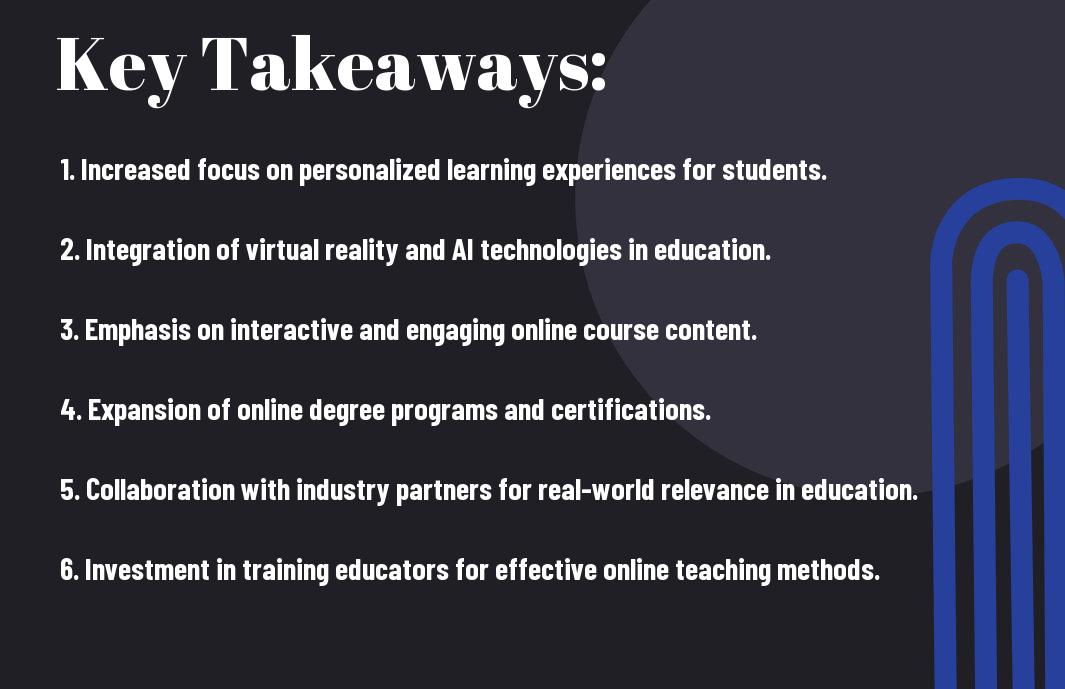It’s no secret that the education landscape is rapidly evolving, with online learning becoming more prevalent than ever. As universities around the globe navigate through these unprecedented times, adapting to a digital world has become not just a choice, but a necessity. From virtual lectures to interactive online platforms, institutions are revolutionizing the way they deliver education to students. This shift not only opens up opportunities for remote learning but also poses challenges in ensuring quality education and student engagement. Let’s probe how universities are embracing technology to shape the future of education.
Key Takeaways:
- Digital Transformation: Universities are adapting to a digital world by transforming their traditional classroom settings into online learning platforms.
- Technology Integration: Incorporating tools like virtual classrooms, online resources, and interactive learning activities are shaping the future of education.
- Global Reach: Online learning allows universities to reach a wider audience of students across the globe, making education more accessible and inclusive.


The Rise of Virtual Classrooms
Beyond Zoom: Next-Gen Virtual Learning Environments
To truly revolutionize online learning, universities are looking beyond basic video conferencing tools like Zoom. The future lies in next-generation virtual learning environments that offer immersive and interactive experiences for students. These platforms go beyond traditional lectures by incorporating features like virtual whiteboards, breakout rooms, and real-time collaboration tools.
The Tech Stack: Integrating AI and VR for Immersive Experiences
Integrating AI and VR technologies into online learning platforms is the next big step in creating truly immersive educational experiences. AI can personalize learning paths for students, provide real-time feedback, and even assist professors in grading assignments. VR, on the other hand, can transport students to virtual classrooms, labs, and even field trips, making learning more engaging and memorable.
With AI analyzing student data and adapting the curriculum in real-time, and VR creating immersive environments where students can interact and learn by doing, the possibilities are endless. Universities that embrace these technologies will not only enhance the learning experience but also stay ahead of the curve in the ever-evolving landscape of online education.
Customization and Personalization in Learning
It How online learning could revolutionize higher education is no secret that online learning is reshaping the way education is delivered. The future of learning lies in customization and personalization, where universities are adapting to a digital world to cater to individual needs and preferences.
AI-Driven Learning Pathways: The End of One-Size-Fits-All
For modern learners, the days of one-size-fits-all education are behind us. With the power of Artificial Intelligence (AI), universities can now offer personalized learning pathways that cater to each student’s unique learning style, pace, and preferences. This tailored approach not only enhances the learning experience but also boosts engagement and retention rates.
Real-Time Analytics: Tailoring Education to Individual Pace
Education is no longer a one-way street; it’s a dynamic process that evolves in real-time. With real-time analytics, universities can now track students’ progress, identify areas of strength and weakness, and adjust the curriculum accordingly. This level of personalized guidance ensures that each student can learn at their own pace and reach their full potential.
The Business of Online Education
Monetization Models: Subscription vs. One-Time Fees
After diving deep into the world of online education, one of the key aspects that universities are grappling with is the monetization model. Should they go with a subscription-based model or charge one-time fees for courses? The subscription model offers recurring revenue and encourages continuous learning, while one-time fees may attract students looking for a more traditional payment structure.
Balancing Quality and Access: Scaling Education for the Masses
On the flip side, universities face the challenge of balancing quality and access when it comes to scaling education for the masses. With the rise of online learning, institutions must ensure that they maintain high standards of education while reaching a broader audience. Scaling education for the masses can be a double-edged sword, providing opportunities for growth but also posing risks of diluting the quality of education.
Monetization in the online education space is a complex beast that requires a delicate balance of experimentation and analysis. Subscription models can provide a steady stream of income, but may also risk alienating students who prefer one-time payments. On the other hand, one-time fees offer immediate cash flow but may limit long-term revenue potential. It’s crucial for universities to carefully consider their monetization strategies to ensure sustainable growth in the digital world.
Challenges and Solutions
Overcoming the Digital Divide: Ensuring Inclusive Access
One of the biggest challenges in online learning is bridging the digital divide to ensure that all students have equal access to educational resources. This issue is particularly critical for students from low-income backgrounds or rural areas who may not have reliable internet connections or necessary technology. Universities are working on solutions such as providing loaner laptops, creating mobile-friendly course materials, and partnering with local communities to expand access to high-speed internet.
Academic Integrity: Combating Cheating in the Digital Realm
With the shift to online learning, maintaining academic integrity and combating cheating has become a major concern for universities. Proctoring software, plagiarism detection tools, and secure online exam protocols are being implemented to uphold academic standards in the digital realm. Understanding the motivations behind cheating and educating students on the importance of honesty and ethics in their academic work are necessary in addressing this issue.
Conclusion
The future of online learning is bright, my friends. Universities are finally catching up to the digital world and embracing the power of technology to deliver education in new and exciting ways. With the rise of online courses, virtual classrooms, and interactive learning platforms, students are no longer bound by the walls of traditional academia. It’s time to embrace this change and leverage the endless possibilities that technology offers. So buckle up, get ready for an epic ride, and embrace the digital revolution in education. Let’s disrupt the old ways and create a brighter future for all learners!
FAQ
Q: How are universities adapting to the digital world?
A: Universities are adapting to the digital world by offering online courses, creating digital learning platforms, and leveraging technology to enhance the educational experience.
Q: What are the benefits of online learning?
A: Online learning offers flexibility, convenience, and access to a wide range of courses and programs for students around the world.
Q: How do universities ensure the quality of online education?
A: Universities ensure the quality of online education by hiring qualified instructors, designing interactive course materials, and providing support services for online students.
Q: What role does technology play in online learning?
A: Technology plays a crucial role in online learning by enabling interactive learning experiences, collaboration among students, and real-time feedback from instructors.
Q: How do universities engage online students?
A: Universities engage online students through virtual discussions, interactive assignments, and live video lectures to create a dynamic learning environment.
Q: What are some challenges universities face in the transition to online learning?
A: Some challenges universities face in the transition to online learning include ensuring equitable access to technology, maintaining academic integrity, and providing adequate support for online students.
Q: How can students make the most of online learning?
A: Students can make the most of online learning by actively participating in discussions, seeking help when needed, and staying organized to manage their time effectively.





